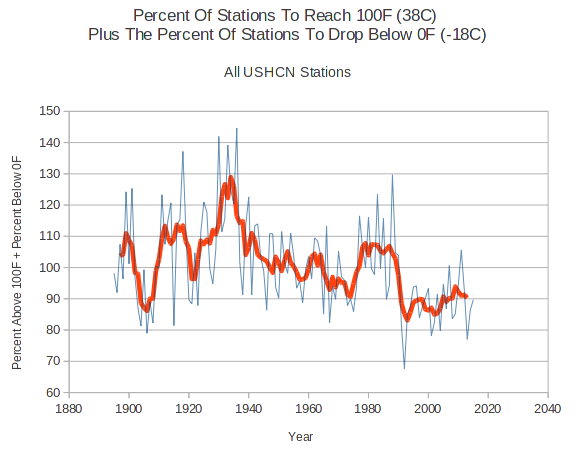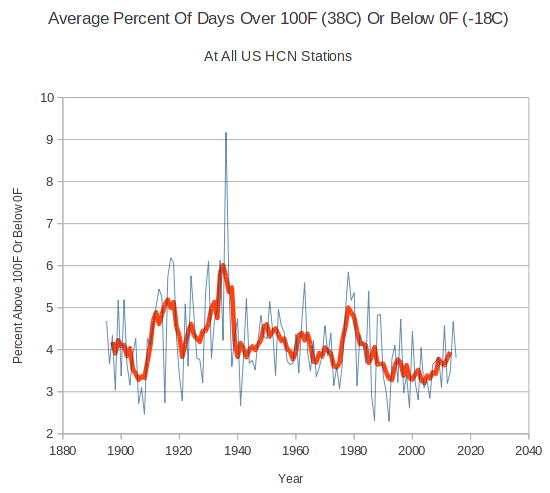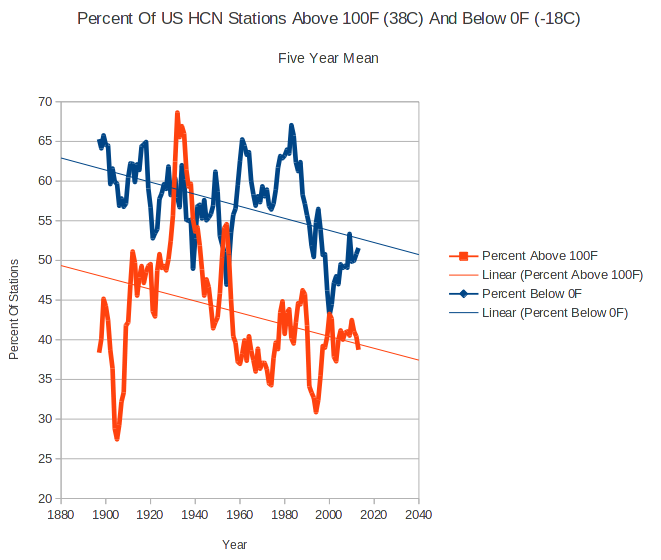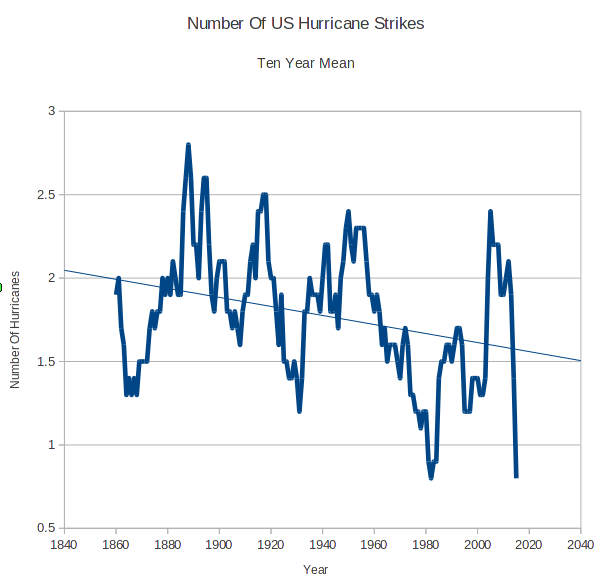The area of the country affected by very hot days or very cold nights has been declining since the 1930’s.
The frequency of very hot and very cold weather is also decreasing.
The trend is similar for both very hot days and very cold nights.
Additionally, the frequency of US hurricane strikes (which peaked in the 1880’s) is down 25% since the Civil War and is now at historic lows
This is the exact opposite of the propaganda being put out by government agencies, whose job is to push the climate change scam, not report facts.






You have presented tons of evidence that the claims of “extreme weather” have not only been exaggerated, but are actually showing a decline. Tornadoes also seem less frequent as well.
But as always, sooner or later some major weather disaster will take place. When it does, you can guarantee that the usual alarmist buzzards will circle and say the world is coming to an end, unless we increase their funding ten fold and immediately switch to a one world communist totalitarian dictatorship, with skeptics rounded up and shot on sight!
Andy DC
Tornados are down again this year though there was a pretty high spike in Feb. Over 100 less than the average as of yesterday. There have been only three EF-3 tornadoes so far this year and no EF-4s or 5s.
http://www.spc.noaa.gov/wcm/ptorngraph.png
So it’s looking like 2016 will be another year with tornadoes well below average.
CRAP! click on the graph to get the most recent graph which I was referring to. WordPress archive does it again.
Hey RAH, trying link with different capitalizations in first part of URL
http://Www.sPc.noaA.gov/wcm/ptorngraph.png
that was http://Www.sPc.noaA.gov
I’ll do that next time if I can remember Neal. Thanks!
You just need to pick a different set of capitalizations from previously for that URL. I just encoded the date 4/21 as binary in the first three dot separated portions of the URL. I realize that this scheme is not perfect as you cannot encode above 9 for the month, but I would just pretend as if the fourth bit were there. Chances of a collision are low.
Houston threatened by storms.
http://www.accuweather.com/en/us/houston-tx/weather-radar-r1h?play=1
The cause is cold front from the northwest.
Yes and that line just like the last will arc to the NE losing significant power and moisture as it does. Right now here in central Indiana were getting the residuals from the first big flooding line of storms that passed over the Houston area and it’s nothing to write home about.
Re: Houston weather. This is how the climate “scientists” define a major drought…
In the middle of the week jetstream again pulls cold air south.
http://vortex.accuweather.com/adc2004/pub/includes/columns/newsstory/2016/650x366_04211411_hd34.jpg
This is what NOAA Strom prediction center shows for Tuesday:
http://www.spc.noaa.gov/products/exper/day4-8/day5prob.gif?1461334146111
The drop in maxima is global, at ca.- 0.13K since 2000 and normally it drags means and minima downward as well. However, new vegetation (plants, trees, lawn) traps some heat. This is a local thing and can be clearly observed in places like Las Vegas where minima have jumped. This is where they changed a desert into an oasis.
So depending on how you chose your stations (globally unbalanced, where people are starting to expand, wanting greenery, gardens and crops) you would see a trend of an improving climate.
That is the irony of it all: the greener earth gets, the warmer it gets…..
So maybe, after all my research, I must say there is some AGW?
Dont you know Steve, its the lack of extreme weather that is driving all of the extreme weather!
The Tanana river ice breakup watch started at the Nenana Ice Classic 2016. This year is the 100th anniversary of the event.
I think the locals are not unhappy that it’s sunny this week with daily highs in mid-50s and nights just above freezing.
The camera updates are available here.
https://www.youtube.com/watch?v=zlUeTkIbZ-s
Reblogged this on Climate Collections.